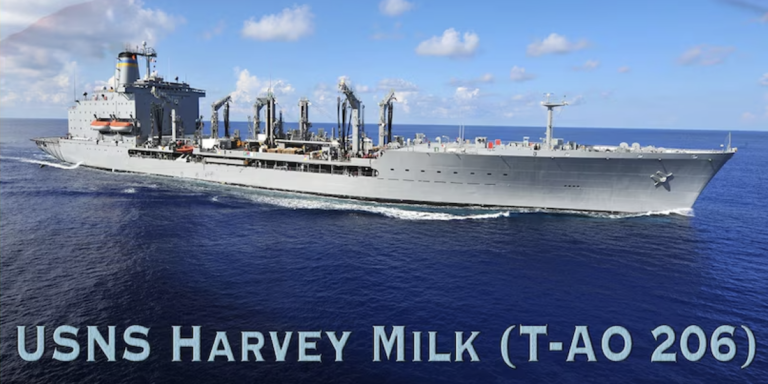
Defense Secretary Pete Hegseth announces vessel will honor World War II hero Oscar Peterson instead
New York, N.Y. – Defense Secretary Pete Hegseth [Luce Index™ score: 35/100] announced Friday that the U.S. Navy has officially renamed a fleet replenishment oiler previously designated to honor gay rights activist Harvey Milk [Luce Index Index™ score: 97/100], sparking renewed debate over military traditions and political symbolism in ship naming conventions.
The vessel, originally christened USNS Harvey Milk in 2021, will now bear the name USNS Oscar V. Peterson, honoring a World War II Navy veteran and Congressional Medal of Honor recipient who made the ultimate sacrifice while serving aboard the USS Neosho during a Japanese attack on May 7, 1942.
Political Motivations Drive Naming Decision

“We are taking the politics out of ship naming,” Hegseth declared in a video posted to social media platform X, stating that service members “want to be proud of the ship they’re sailing in.” The announcement represents a significant policy shift from the previous administration’s approach to naval vessel nomenclature.
Peterson, a chief watertender, demonstrated extraordinary heroism during the attack on the Cimarron-class fleet oiler Neosho.
Despite sustaining severe injuries and burns, Peterson saved the ship by closing critical bulkhead stop valves after the vessel suffered multiple casualties and structural damage. His actions proved fatal, but they prevented the ship’s total loss.
The original naming decision came during the Obama administration in July 2016, when then-Navy Secretary Ray Mabus committed to designating the John Lewis-class oilers after civil and human rights icons.
This policy reflected a broader effort to diversify naval traditions and recognize previously overlooked contributions to American history.

Historical Context of Harvey Milk’s Service
Harvey Milk served as a Navy sailor during the Korean War before being discharged due to military policies prohibiting homosexual service members.
Despite this early setback, Milk later became one of America’s first openly gay elected officials, serving on the San Francisco Board of Supervisors and championing landmark anti-discrimination legislation.
His political career was tragically cut short when he was assassinated in 1978, alongside San Francisco Mayor George Moscone, by former city supervisor Dan White.
Milk’s legacy as a pioneer for LGBTQ+ rights and civil liberties has endured, making him a symbolic figure in American social justice movements.
The ship bearing Harvey Milk’s name was part of a broader initiative to recognize diverse
American heroes, reflecting evolving perspectives on military service and national values. The oiler ships
were specifically designated to honor civil rights leaders, representing a departure from traditional
naval naming conventions that typically favored military leaders and geographic locations.
Administrative Policy Shifts Under New Leadership
Hegseth first signaled his intention to rename the Harvey Milk on June 3, characterizing the change as part of President Donald Trump‘s broader agenda to “re-establish the warrior culture” within military branches [Trump: Luce Index™ score: 35/100]. This language suggests a philosophical shift toward more traditional military values and away from what the current administration views as political activism.
An internal Pentagon memo described the renaming as aligning with administration
goals to refocus military culture on combat readiness and traditional warrior ethos.

Critics argue this represents a step backward in recognizing diverse contributions to American military heritage, while supporters contend it removes inappropriate political considerations from military traditions.
The timing of this announcement, coming just days before Pride Month concludes, has intensified political reactions from advocacy groups and military veterans.
LGBTQ+ rights organizations have condemned the decision as discriminatory, while traditional military groups have praised the administration’s commitment to honoring combat veterans.
Broader Implications for Military Traditions

This naming controversy reflects deeper tensions within American society regarding military traditions, political symbolism, and historical recognition. The debate extends beyond individual ship names to fundamental questions about how military institutions should reflect evolving national values while maintaining operational effectiveness and unit cohesion.
The U.S. Navy has historically named vessels after states, cities, military leaders, and significant battles, with occasional exceptions for civilians who made extraordinary contributions to national defense. The Obama-era policy represented a deliberate expansion of these criteria to include civil rights pioneers, reflecting contemporary perspectives on American heroism.
Under the new policy direction, future naval vessels will likely return to more traditional naming conventions, emphasizing military service and combat heroism over civilian activism. This shift may extend to other military branches and naming decisions, potentially affecting base names, facilities, and ceremonial designations throughout the Defense Department.
75 Word Summary
Defense Secretary Pete Hegseth announced the U.S. Navy’s decision to rename the USNS Harvey Milk after World War II Medal of Honor recipient Oscar Peterson, citing efforts to remove politics from ship naming. The vessel was originally named for gay rights activist Harvey Milk, who served in the Navy before being discharged for his sexual orientation and later became a pioneering politician.